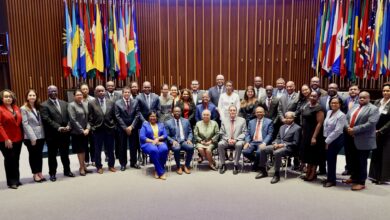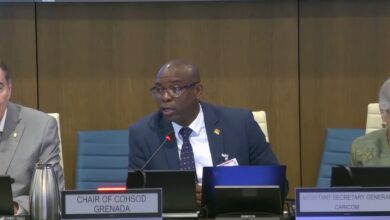(CARICOM Secretariat, Turkeyen, Greater Georgetown, Guyana) The Regional Meeting on Standards of Care for Treatment and Rehabilitation Facilities for Substance Abusers rolled out an ambitious timeline for the completion of its first handbook that will establish the standards for practitioners in drug treatment and care facilities in the Region.
The Meeting which ended on 4 March in Montego Bay, Jamaica agreed that the draft Universal CARICOM Handbook on Standards of Care for Treatment and Rehabilitation Facilities for Substance Abusers would be ready for national and region-wide consultations by June 2009.
The Handbook will contain standards and guidelines for drug treatment practitioners in several critical areas including training and regulations; credentialing and certification; standards for detoxification programmes, outpatient drug free counseling, medication aided drug treatment and standards specific to prison based treatment programmes.
Chair of the Meeting, Ms Beverley Reynolds – CARICOM Secretariat’s Programme Manager for Sustainable Development – explained that the Secretariat would guide the completion of the handbook, drawing on the inputs of more than forty international and regional stakeholders who attended the two-day meeting. Ms Reynolds indicated that a World Health Organisation (WHO) document on Assessing the Standards of Care in Substance Abuse Treatment, was also used to inform the process.
After the consultations slated to be completed by November 2009, the revised handbook – the first of its kind in the Caribbean Region would be submitted in 2010 to the Council for Human and Social Development (COHSOD) for endorsement.
The Meeting, organised jointly by the Inter- American Drug Abuse Control Commission (CICAD) and the CARICOM Secretariat, was supported by the Technical Advisory Body for the CARICOM Regional Drug Demand Reduction Strategy, which was established in 2005 by a mandate of COHSOD 2001.
Dr Anna Chisman, Head of Drug Demand Reduction at CICAD, expressed satisfaction with the outcomes of the meeting, noting that it was “very successful” and commended the CARICOM Secretariat for the critical role it played and the progress made in sensitising the Region on the need for established standards for drug treatment.
Acknowledging that the timeline for completion of the handbook was “ambitious,” Dr Chisman reposed confidence in the Secretariat’s ability to provide the leadership that would ensure its completion in the specified time and reiterated CICAD’s commitment to providing technical support where possible.
“I am confident that something tangible and useful will come out of the process started here today,” she concluded.





